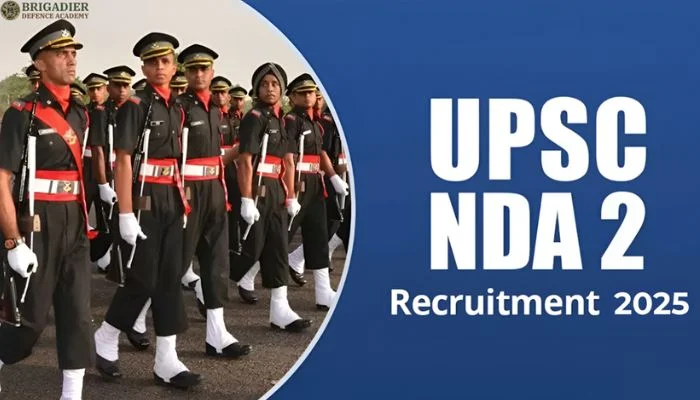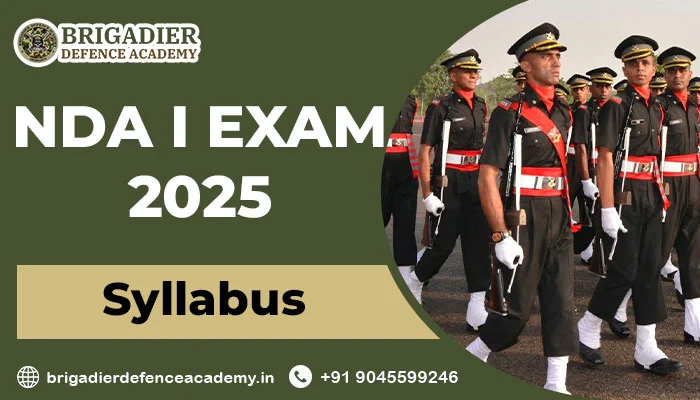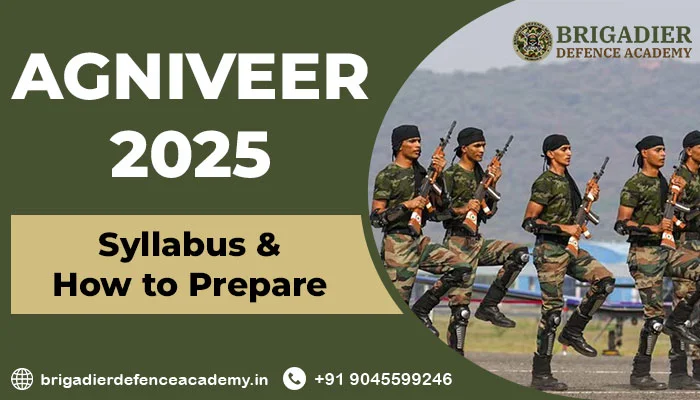Recent Posts

Mission 2025 Begins: NDA-II & CDS-II Notifications Officially Released!


The Life and Bravery of Subedar Yogendra Singh Yadav

The Life and Bravery of Major Kuldip Singh Chandpuri

The Life of Brigadier Mohammad Usman and His Legends of War

The Life of Captain Vikram Batra: Hero of the Kargil War

The Inspiring Journey of Ex-Field Marshal Sam Manekshaw

NDA I 2025 Exam Syllabus

Agniveer 2025 Syllabus and How to Prepare

Agniveer Recruitment 2025: Eligibility Criteria and Physical Standards

The Agniveer 2025 recruitment process offers an incredible opportunity for young candidates to serve in the Indian Navy, Army, or Air Force. To successfully clear the exam, understanding the syllabus and preparing strategically is essential. This detailed guide will help you understand the Agniveer 2025 syllabus and provide actionable tips on how to prepare effectively.
Understanding the Agniveer 2025 Syllabus
The Agniveer 2025 syllabus primarily consists of subjects based on the candidate’s chosen service wing. The exam is divided into different sections covering topics from:
- Mathematics
- Science (Physics and Chemistry)
- General Awareness
- Reasoning
- English Language
Each section evaluates the candidate’s subject knowledge, reasoning ability, and problem-solving skills. Let’s break down the syllabus in detail.
1. Mathematics Syllabus
Candidates can expect questions from:
- Algebra
- Trigonometry
- Geometry
- Statistics
- Probability
- Mensuration
- Number System
- Quadratic Equations
- Progressions
- Matrices and Determinants
Preparation Tip: Practice solving previous year’s question papers and focus on speed and accuracy. Online mock tests are also beneficial.
2. Science Syllabus
The Science syllabus generally includes Physics and Chemistry concepts from Class 10 and 12.
Physics Topics:
- Laws of Motion
- Gravitation
- Optics
- Current Electricity
- Magnetic Effects of Electric Current
- Electromagnetic Induction
- Sound and Waves
Chemistry Topics:
- Atomic Structure
- Chemical Reactions
- Periodic Table
- Chemical Bonding
- Acids, Bases, and Salts
- Environmental Chemistry
Preparation Tip: Strengthen conceptual clarity using NCERT textbooks and practice numerical problems regularly.
3. General Awareness Syllabus
This section assesses your knowledge of current affairs and general knowledge. Topics include:
- National and International Events
- Defence-related News
- Geography
- History and Culture
- Polity and Constitution
- Sports and Awards
- Important Organizations
Preparation Tip: Stay updated with daily news using reputable sources like newspapers, news apps, and magazines.
4. Reasoning Syllabus
Reasoning tests logical thinking, problem-solving, and decision-making skills.
Topics Include:
- Coding-Decoding
- Blood Relations
- Directions
- Series Completion
- Syllogisms
- Puzzles
- Analogies
- Logical Venn Diagrams
Preparation Tip: Practice reasoning puzzles and attempt online quizzes to enhance logical skills.
5. English Language Syllabus
This section tests basic English comprehension and grammar.
Topics Include:
- Reading Comprehension
- Synonyms and Antonyms
- Vocabulary
- Error Detection
- Sentence Improvement
- Idioms and Phrases
Preparation Tip: Enhance your vocabulary by reading newspapers and practicing grammar exercises daily.
How to Prepare for Agniveer 2025 Exam
Here are some practical tips to help you succeed:
1. Make a Study Plan
- Create a realistic and detailed timetable covering all subjects.
- Allocate extra time to challenging subjects while balancing easier ones.
- Incorporate regular breaks to maintain focus and prevent burnout.
2. Practice with Previous Year Papers
- Solve previous years’ papers to understand the exam pattern and difficulty level.
- Time yourself to improve your speed and accuracy.
- Analyze mistakes and focus on weaker sections.
3. Attempt Mock Tests
- Take weekly mock tests to track your progress.
- Simulate exam conditions to build confidence.
- Evaluate your performance and revise accordingly.
4. Stay Physically Fit
- Regular exercise is essential as physical fitness is part of the recruitment process.
- Include cardiovascular workouts like running and strength training.
- Maintain a balanced diet and stay hydrated.
5. Stay Updated
- Follow defence-related news and stay informed about current affairs.
- Dedicate 20-30 minutes daily to reading newspapers or watching the news.
6. Use Effective Study Resources
- Refer to NCERT textbooks for core subjects.
- Use online resources like video tutorials, quizzes, and educational apps.
- Join online study groups or forums for peer learning.
7. Focus on Time Management
- Practice solving questions within a time limit.
- Prioritize questions that you find easier to score well.
- Develop strategies to manage time effectively during the exam.
8. Take Care of Your Mental Health
- Stay positive and motivated throughout the preparation.
- Practice mindfulness or meditation for stress relief.
- Maintain a proper sleep schedule for better retention.
Conclusion
Preparing for the Agniveer 2025 recruitment exam requires dedication, consistent effort, and a strategic study plan. With a clear understanding of the syllabus and a disciplined preparation routine, candidates can enhance their chances of success.
Stay committed, practice diligently, and believe in your abilities. Your journey towards becoming an Agniveer and serving the nation starts with effective preparation.
Best of luck!
Follow the The Devbrat Sir Code channel on WhatsApp: https://whatsapp.com/channel/0029Va5H6or8F2p777rpcQ2m
FAQs
1. What subjects are included in the Agniveer 2025 syllabus? The syllabus includes Mathematics, Science (Physics and Chemistry), General Awareness, Reasoning, and English Language.
2. How can I prepare for the Agniveer exam effectively? Create a study plan, practice previous years’ papers, take mock tests, and stay physically fit to ensure well-rounded preparation.
3. Are there negative marks in the Agniveer 2025 exam? Yes, negative marking may apply, so it is advisable to attempt questions carefully.
4. What are the best resources for Agniveer preparation? Use NCERT textbooks, online mock tests, educational apps, and current affairs websites for comprehensive preparation.
5. Is physical fitness important for Agniveer recruitment? Yes, physical fitness is crucial. Candidates must pass a Physical Fitness Test (PFT) as part of the selection process.





